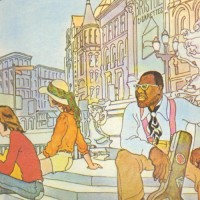Born Chester Arthur Burnett, Howlin’ Wolf was better known and made a greater impact than the U.S. president he was named after.
His influence is broader than any Chicago bluesman, save for friend and sometimes rival Muddy Waters, and homages to his music can be heard beyond the blues to the core of rock music itself. His commanding voice could range from blues yodeling to moaning to field hollering, and often boomed like a shooting cannon.
Howlin’ Wolf was by his own admission never a master musician, but he knew how to give listeners the true feeling of the blues. Chess was his record company for almost his entire career, and through now-parent MCA, released a huge box set of his better-known works in 1991. Eventually, there is also a shorter compilation simply titled His Best.
MCA Chess went deeper still with the 1994 release of Ain’t Gonna Be Your Dog: Chess Collectibles, Vol. 2. The liner notes said this two-album deep dive “presents the 1951-1969 studio highlights from Chess not previously issued on MCA Chess.” A collection of outtakes, unreleased tracks, and recordings otherwise uncovered by the sprawling box set, Ain’t Gonna Be Your Dog had all the markings of a curio aimed squarely at hard-core Howlin’ Wolf fans.
On the contrary, it was an essential anthology of the genius of Howlin’ Wolf’s music.
The first third of the 42 tracks covers his pre-Chicago sessions in Memphis at the studio of Sam Phillips, who subsequently discovered Elvis Presley and also oversaw the recording of the first rock ‘n’ roll tune, Ike Turner’s “Rocket 88.” Howlin’ Wolf’s music was evidently already fully formed by this time. His signature howling-like singing and soulful harp playing is already on display, but there were other markers of the Howlin’ Wolf sound: Willie Johnson’s distinctive, over-amplified guitar provided inspiration for rock bands some 12 to 15 years later.
Additionally, tunes like the talking blues of “Look-a-Here Baby” and “Everybody’s In the Mood” swing hard for being blues. Jazz boogie wasn’t so uncommon in blues at that time; T-Bone Walker and Louis Jordan rode that mix to great popularity. But Howlin’ Wolf pulls it off without losing any of his Delta influence.
There were a few other uncommon touches here and there, like the use of horns in a small group setting (“Oh Red”), and even a drum solo on the track “Hold Your Money.”
The next phase of Howlin’ Wolf’s recording career, the first Chicago years from 1954-59, is covered from “Come to Me Baby” to “My People’s Gone.” This was a transitory period for Wolf, with much of the Memphis sound still intact. Johnson’s guitar was increasingly replaced by a maturing Hubert Sumlin, and the overall sound becoming more refined. The use of reverb increases; it’s put to haunting, very effective effect on the “Moaning for My Baby” alternate “Midnight Blues.”
The four tracks that follow “My People’s Gone” are during Howlin’ Wolf’s early-1960s peak, with three of those tracks penned by Willie Dixon, the Cole Porter of the blues. While “Long Green Stuff” and “Mama’s Baby” are less familiar than, say, “Wang Dang Doodle” or “Spoonful,” they show once again that Dixon’s chaff still exceeded most other blues composers’ wheat.
And it didn’t matter anyway when Hubert Sumlin, a boy that Howlin’ Wolf took under his wing at just 14 years old in the late-1940s, had by then blossomed into one of the most formidable electric guitarists on the Chicago blues scene. His slinky lines on these and other Wolf sides have been copied and recycled endlessly over the decades, most notably by Robert Cray.
The quality of material started to fall off a tad over the next five tracks as Ain’t Gonna Be Your Dog: Chess Collectibles, Vol. 2 moved into the mid- to late-1960s. Still, Sumlin’s guitar combined with Wolf’s still-potent vocals could be counted on to save the day, like on the otherwise humdrum “I Had A Dream.” “The Big House” is almost a dead ringer for Bob Dylan’s “Rainy Day Women #12 & 35” until Hubert cuts loose with a Keith Richards sound-alike solo – except that it’s been Keith who was imitating Hubert all along.
The last five Ain’t Gonna Be Your Dog tracks are 1968 recordings which find Howlin’ Wolf alone with just an acoustic guitar. He stamps out the rhythm, adding some casual talk about his musical roots along the way. Wolf had been performing as a musician at least part time since the early ’30s, but didn’t start recording until some 20 years later. So, this is a rare glimpse to what Howlin’ Wolf might have sounded like in his formative years.
“Woke Up This Morning” is the best of this short batch, and here he displays the still-nimble acoustic guitar picking he learned first hand from such Delta luminaries as Charley Patton.
Through it’s occasionally been out of print, Ain’t Gonna Be Your Dog: Chess Collectibles, Vol. 2 is still very much a record to seek out for anyone wanting a solid bedrock in their blues record collection. You still should start your Howlin’ Wolf collection with the Chess box but, if you can find it, this is the logical follow-up acquisition.
- Claudio Scolari Project – ‘Bloom’ (2025) - June 12, 2025
- Denny Zeitlin – ‘With a Song In My Heart: Exploring The Music of Richard Rodgers’ (2025) - June 4, 2025
- Ches Smith Quartet – ‘Clone Row’ (2025) - May 30, 2025




I have been hoping to find a copy of Wolf’s “My People’s Gone” since I heard it on a radio show years ago.
It includes a style of guitar playing I have not heard Hubert Sumlin play, and I have most of the official Chess recordings from the analog LP era, but perhaps it is not Hubert, and is Willie Johnson ?
The song has been released on more than one Japanese Howlin’ Wolf compilation CD, and has also been released in a 5CD or 7CD – ? – box set titled “The Complete Recordings – 1951 – 1969”, which has also been deleted !
So, why do these compilations get deleted, but others with less tracks remain available ?
I think it may be that some Record Companies rarely delete, and others regularly do – as soon as the initial manufactured batch is sold.
One would think MCA would have the actual complete set available in preference to the lesser tracks’ “The Chess Box”,
or does that involve a license problem with who-ever owns Sun in the USA ?